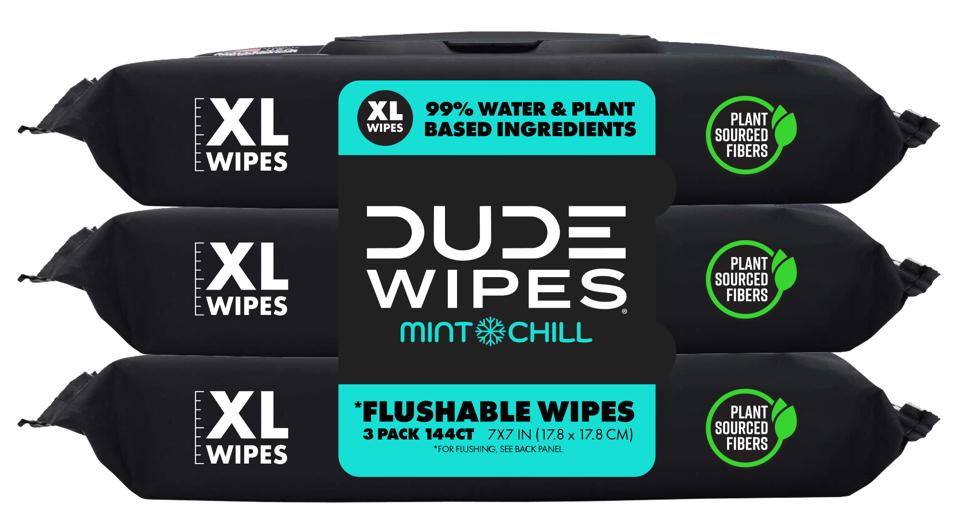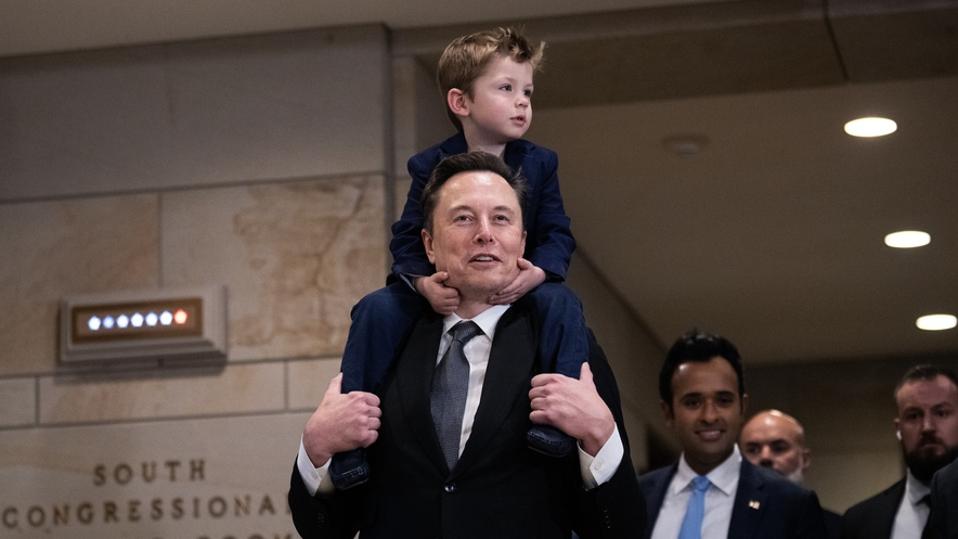Dude Wipes’ potty-mouthed founders have already grabbed 1% of the US$11 billion toilet paper market. Now the Mark Cuban-backed startup is aiming to swipe up to 10%.

Sean Riley sits in the corner of the “Dump Room,” the actual name of his company’s conference room on the sixth floor of a modest multi-tenant office building in Chicago’s West Loop. Dressed in a green tie dye shirt and relaxed jeans, Riley, the 39-year-old cofounder and CEO of Dude Products (or as he calls himself, “Chief Dude Officer”), points out the window to a red brick behemoth across the street. “You see that building right there, that whole city block.
That’s all Kimberly Clark, and that’s just their Chicago office,” he says incredulously. Kimberly Clark owns Cottonelle, one of Dude’s key competitors and the $20 billion (2023 sales) consumer goods giant set up shop across the street in 2021, just a few months after Dude moved in. “Where are the binoculars?” quips cofounder Ryan Meegan, Dude’s chief marketing officer, from Riley’s side.

He’s only half joking. Since starting Dude Products in 2011, Riley, Meegan and a third cofounder, Jeff Klimkowski, childhood friends from the Chicago suburbs, have closely studied the trail left behind by “Big Toilet Paper” leaders like Kimberly Clark and Procter & Gamble – everything from the design of their newest rolls to their latest ad campaigns – and have done, well, the exact opposite. Where Charmin has friendly looking bears and Angel Soft, a cherubic baby, Dude Wipes has lewd emojis and potty puns. Toilet paper packaging is white; Dude sells its extra-large wipes, in flavors like “Mint Chill” and “Shea Butter Smooth,” in jet black packaging. (It costs $4.99 for a pack of 48.) “Those guys wouldn’t even use the word butt until like two years ago,” says Riley of his competitors.
They’ve foregone traditional marketing for viral stunts, starting with their 2015 appearance on Season 7 of the hit business show “Shark Tank,” where they won over billionaire Mark Cuban by telling him his “ass hates him” for using dry toilet paper. Cuban cut a $300,000 check for 25% of the business, still the only money they’ve raised to date. For this year’s Super Bowl, Dude bought multiple giant billboards overlooking the Las Vegas strip which it populated with potty jokes personalized to singer Taylor Swift (“It’s me. Hi. I’m the solution. It’s me. Not TP.”) and her boyfriend, Travis Kelce, a star of the Super Bowl winning Kansas City Chiefs (“We love a clean tight end, too.”).
It’s not just the foul humor that’s paying off. Dude’s founders have been very conservative in how they’ve grown their business. Until 2016, Riley was the only full-time employee; the other cofounders kept their day jobs to fund the business while Riley himself drove Ubers and waited tables for extra cash. There are now just 21 employees as Dude outsources all its manufacturing to the same Arkansas-based facility used by its competitors. They’ve forgone funding opportunities and scrapped diversification plans — including the launch of Dude-themed body washes and deodorants, which they tried briefly pre-Covid – in favor of organic growth with a single-minded focus on just one thing: wet wipes.
Now, the results are showing. One of the most successful businesses in Shark Tank history, Dude Products rolled up $110 million in revenue last year, from $70 million in 2022. The company, which has been profitable since 2016, now makes up 1% of the $11 billion toilet paper industry. The founders predict Dude will do $500 million in annual sales within five years and ultimately grow into a $1 billion (sales) brand. “We think that’s all pretty achievable,” says Riley. For now, it has some catching up to do to reach category leaders but Dude’s products are now available in more than 20,000 stores across the U.S., including the toilet paper aisles of Walmart, Target and Kroger. Coming next: Sam’s Club and Costco, where the wipes are currently being tested online and in Alaska.

Dude’s founders put together their Super Bowl ad in a matter of days after getting a tip about open billboard space on the front of Resorts World overlooking the Las Vegas strip. “It was just vintage stunt Dude Wipes, which everyone has come to expect from us,” says Meegan.
Dude Wipes
“I think we were absolutely insane to go from $0 to $100 million. So now when you’re telling me do I think it’s difficult to go from $100 million to $500 million? No, just given all that we’ve come from. Based on the new distribution alone, we’ll get to $500 million,” says Klimkowski. “Really the question mark here is to get from $500 million to $1 billion and that all has to do with moving the needle on household penetration, which again, I feel very confident.”
Surprisingly it’s not just men enjoying the product. The company claims about 50% of its users are women, choosing the brand over traditional toilet paper because it “cleans better.”
“No-one else is doing anything like it,” says Cuban, whose son orders the wipes. The billionaire says he mooches off his kid and enjoys the “regular” (unscented) wipes. “They created a culture and community around the product that is fun,” adds the billionaire, who talks regularly with the founders about strategy. “Someone sh-ts their pants in public and they talk about it.”
It’s a simple and cheap product built around a fairly radical concept. “Toilet paper doesn’t fully get the job done,” argues Meegan, who prior to Dude, worked in sales and marketing for his dad’s business, a manufacturer of the luxury portable restrooms you find at golf tournaments or other high-end events. Meegan calls it ironic that he ended up in the toilet industry too, though watching his dad build a business from the ground up taught him the ropes of starting something from scratch.
The cofounders say they stumbled onto the idea when they moved into their first apartment in Chicago. They graduated from different colleges but stayed in contact and were all working nine-to-five jobs in the city – Riley in sales for a construction tech firm, Klimkowski as an investment banker. (Their fourth cofounder, Brian Wilkin, left in 2018 to pursue other ventures, according to Riley; Wilkin did not respond to an interview request from Forbes.) That’s when Riley began stocking their communal bathroom with baby wipes. The habit caught on quickly among the roommates and their friends, which is when they realized they might be onto something.
After sketching up the prototype (Riley still keeps the original, a white cardboard box with “Dude Wipes” penciled on the side, in his office), they found their manufacturer by researching where other flushable wipes brands made their products. They pooled together $30,000 of their savings and spent $25,000 on buying the wipes, leaving them with $5,000. The result, explains Riley: “We didn’t have any money really for marketing but we had product.” They began handing out wipes for free to anyone who would take them, including at music festivals (they paid $1,500 for a booth at a local electronic music festival) and on college campuses (their first big order was selling $400 worth of wipes to a frat house at Illinois State University). This a tactic the company still uses to this day – Dude says its products will be sampled to “hundreds of thousands of students” at freshmen orientations this year via a partnership with Amazon. They also found a surprising partner in subscription boxes, like Mystery Tackle Box, which were always looking for new fillers.

Among Dude’s surprising fans is musician John Mayer, who sent the company a message on Instagram last year asking them to release single packs with two wipes instead of one. The “two wiper” will be released later this year.
Dude Wipes
In 2013, Dude was doing just $20,000 in sales when the founders started approaching major retailers, hiring a broker in Cincinnati to help secure the meetings. Most laughed them out of the room until they met with Kevin Darcy, the head of toilet paper at Kroger, in 2014. By this point, Dude’s sales had jumped to $225,000, thanks in large part to their success on Amazon, where they were steadily racking up repeat customers. “He was like this is early but you know what, I like it. I’m in toilet paper. There’s not anything cool. There’s not anything new. I’m going to give you a shot,” Riley recalls. (Darcy declined an interview due to Kroger’s press policy.) In 2015, Dude signed a $2 million deal to stock its wipes in the toilet paper aisle of 2,000 Kroger stores.
That same year, they finally got a “yes” from Shark Tank’s producers after two previous attempts to get on the show. The effect was almost immediate: sales doubled to $3 million in 2016, up ten-fold from 2015 (thanks in part to the Kroger deal also). They were able to leverage the momentum from the show for a trial in 1,500 Walmart stores in 2018, which went so well that Dude secured a permanent position in Walmart’s toilet paper aisle, or as Riley calls it, the “Super Bowl” of toilet paper. “They had identified opportunities to serve the customer in a different way that others weren’t,” says Will Loan, the Walmart buying manager who brought in the wipes, citing the male-focused marketing, larger wipe size and packaging. He adds: “They were willing to talk the customer about something everyone experiences (bowel movements) but no other brand was willing to do at that time.” Today, sales in Walmart stores and on Walmart.com make up about 15% of Dude’s total revenue, with retail comprising about half of Dude’s overall sales. Its biggest channel is Amazon, which makes up 38% of revenues.
Things were already rolling for “the Dudes” when COVID struck. As toilet paper aisles across the country emptied, more and more desperate shoppers began searching up alternatives and stumbling upon Dude Wipes. From there an interesting trend began to emerge: 75% of customers who bought wet wipes for the first time during the pandemic went back to buy the products again, according to Dude’s own studies of consumer data. The overall category has grown in size by 35% since 2020, compared to 5% growth in dry toilet paper during the same time period, data from Nielsen analytics shows. Part of that is because of the sheer size of the dry toilet paper industry: $9.9 billion in sales in 2020 versus $530 million for wet toilet paper. Dude made up more than 40% of this category growth.
This gave the founders an idea. Instead of existing “adjacent” to toilet paper as was their strategy previously, could Dude Wipes directly compete with it? The company commissioned studies looking at how consumers reacted to replacing dry toilet paper with wet and found 95% of toilet paper users preferred their experience with wipes. They put in place a plan. With more money to spend on marketing (they’re doubling last year’s $15 million budget), at least 5,000 new retail locations on the horizon and a larger pack size soon to be released (like with toilet paper, they say their customers want to buy in bulk), Dude is aiming to lead a dramatic expansion of the category. The founders project they will surpass $160 million in revenue by the end of this year and $500 million by 2029.“We’re on the disruption toilet paper path, like hey can we move everyone over to this solution?” says Riley.
To that end, the Dudes in 2022 hired as a consultant Pete Carter, a 40 plus year marketing director from Procter & Gamble who led the transformative campaigns for products like Tide Pods and Swiffer. Carter, who calls himself “the Old Dude,” is guiding what he describes as the company’s “mass media” campaign. Up until recently, most of Dude’s marketing was through social media and word of mouth. Now, they’re investing heavily on a national advertising blitz, including a TV commercial that will play across the country through December (they first ran it in select markets during the Super Bowl), radio spots and billboards. They also sponsored a NASCAR race, “The Dude Wipes 250,” at the Martinsville Speedway track in Virginia in April. Along with more traditional ads, Dude is focused on “behavior change advertising” aimed at showing consumers there is an alternative to toilet paper. According to Carter, a test run the company did last year in several markets yielded “double digit” growth in retail. “And that’s on top of a business that was already growing double digits.”

Dude sponsored Nascar driver Anthony Alfredo, who placed #5 in the 2024 Dude Wipes 250 in April.
James Gilbert/Stringer/Getty Images
Noting these early results and the “runway” due to the current “low awareness” of the brand, Carter views the Dudes’ goal of swiping a significant portion of toilet paper users as very achievable. He likens it to the challenge faced by Swiffer: “We were up against 100 year old brooms and mops and old technology like that and what we found is people still have a broom in their house but they’re using swiffer more often,” says Carter. “As that grows and they get more comfortable with it, people will change their habit.”
Burt Flickinger, a retail consultant who works with Procter & Gamble, Kimberly and Clark and other flushable wipes makers, is less convinced. He calls Dude’s plan for domination “overly ambitious” (the toilet paper market has been around for about 1,500 years, after all). But he does see plenty of opportunity to expand the category by being “complementary” to toilet paper. “With truckers, people doing more long distance traveling, hiking, camping, etc., Dude could very well be the primary or sole consideration.”
Cuban’s take: “It’s not about changing habits but about filling a need that is already there,” the billionaire says.
One factor that could help: convincing consumers it’s not any worse for the environment and maybe it’s even better. To help educate consumers that their wipes are flushable and biodegrable, the founders are lobbying for the passage of the Wippes Act, which they helped promote and is currently moving through Congress. The act, if passed, would promote clear labeling distinguishing between which ones can and cannot be flushed.
There is of course the threat that Kimberly & Clark and other giants move to stamp out Dude’s success with their own multi-billion dollar marketing campaigns. As of now, flushable wipes “are a pimple on the butt of the toilet paper behemoths,” says Carter, explaining: “Nobody is putting a lot of effort into it because there’s not a lot of technology they can throw at it to capture a big market.” But that could change, especially as Dude gains ground on Cottonelle. That’s why it’s important for Dude to act now and get its name out there as much as possible, says Flickinger.
The brand is Dude’s best defense, Riley agrees. “That’s how you compete with a Goliath is being completely differentiated and doing things they can’t do,” he says. “We can never compete with their capital and their people. But they can’t compete with our spirit and our creativity, how fast we move and the things we say. The Dudeness is the magic.”


